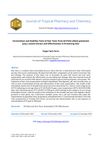6 citations,
January 2023 in “Evidence-based Complementary and Alternative Medicine” Combining yoga and certain herbs can effectively manage PCOS symptoms and improve quality of life.
 December 2024 in “Cureus”
December 2024 in “Cureus” Baricitinib treatment for alopecia universalis can cause hair regrowth with unexpected whitening.
 233 citations,
November 2002 in “The journal of investigative dermatology/Journal of investigative dermatology”
233 citations,
November 2002 in “The journal of investigative dermatology/Journal of investigative dermatology” Creating stronger blockers for skin enzymes might lead to better treatment for conditions like acne and excessive hair growth.
 21 citations,
July 2017 in “Journal of Cosmetic and Laser Therapy”
21 citations,
July 2017 in “Journal of Cosmetic and Laser Therapy” Vesicular carriers like liposomes may improve cosmetic skin treatment delivery and effectiveness but need more human research.
 1 citations,
August 2020 in “IntechOpen eBooks”
1 citations,
August 2020 in “IntechOpen eBooks” Old drugs like finasteride and spironolactone are being successfully used for hair loss and skin conditions, and many other drugs show promise for new uses in dermatology.
 18 citations,
February 2022 in “Cell Death Discovery”
18 citations,
February 2022 in “Cell Death Discovery” ECM1-modified stem cells can effectively treat liver cirrhosis.
 9 citations,
March 2011 in “Oxidative stress and disease”
9 citations,
March 2011 in “Oxidative stress and disease” Some herbal treatments are effective for skin disorders, but more research and regulation are needed.
 April 2024 in “Cell death and differentiation”
April 2024 in “Cell death and differentiation” Cell death shapes skin stem cell environments, affecting inflammation, repair, and cancer.
 36 citations,
September 2019 in “Journal of Herbal Medicine”
36 citations,
September 2019 in “Journal of Herbal Medicine” Herbal nano-formulations show potential for effective skin delivery but need more research.
 57 citations,
September 2017 in “Journal of controlled release”
57 citations,
September 2017 in “Journal of controlled release” Nanocarrier-loaded gels improve drug delivery for cancer, skin conditions, and hair loss.
 39 citations,
September 2013 in “Journal of Cosmetic Dermatology”
39 citations,
September 2013 in “Journal of Cosmetic Dermatology” Herbs can potentially treat hair loss by inhibiting a key enzyme and promoting hair growth, and deficiencies in zinc, biotin, and iron are linked to hair loss.
 1 citations,
January 2013 in “Springer eBooks”
1 citations,
January 2013 in “Springer eBooks” Cosmeceuticals may benefit skin health but need more research for efficacy and safety confirmation.
 August 2024 in “Indian Journal Of Clinical Practice”
August 2024 in “Indian Journal Of Clinical Practice” A balanced diet and healthy lifestyle help manage PCOS symptoms.
 February 2024 in “ACS Omega”
February 2024 in “ACS Omega” The Shen Bai Hair Growing Decoction may help treat hair loss by promoting hair growth and reducing inflammation.
May 2024 in “Molecules/Molecules online/Molecules annual” Plant extracts can help prevent hair loss and promote hair growth.
5 citations,
December 2023 in “Materials” Organic and biogenic nanocarriers can improve drug delivery but face challenges like consistency and safety.
 December 2023 in “Migration letters”
December 2023 in “Migration letters” Herbal treatments can help manage PCOS symptoms.
 581 citations,
February 1998 in “The American Journal of Medicine”
581 citations,
February 1998 in “The American Journal of Medicine” Herbal remedies can cause adverse effects and need more safety research.
 41 citations,
July 2015 in “Current Drug Discovery Technologies”
41 citations,
July 2015 in “Current Drug Discovery Technologies” Some plants may help with hair growth and have fewer side effects than synthetic drugs, but more research is needed to confirm their effectiveness.
 December 2022 in “Journal of Tropical Pharmacy and Chemistry”
December 2022 in “Journal of Tropical Pharmacy and Chemistry” The hair tonic made from oil palm leaf extract is very effective in preventing hair damage from the sun.
 1 citations,
February 2023 in “Drug Design Development and Therapy”
1 citations,
February 2023 in “Drug Design Development and Therapy” Plant adaptogens may help treat skin diseases and improve skin health, but more research is needed to fully understand how they work.
 3 citations,
June 2004 in “Alternative and Complementary Therapies”
3 citations,
June 2004 in “Alternative and Complementary Therapies” The document concludes that hair loss is influenced by genetics and other factors, and while treatments like finasteride can help, they have limitations and side effects.
 25 citations,
July 2017 in “Archives of Dermatological Research”
25 citations,
July 2017 in “Archives of Dermatological Research” Herbal products might promote hair growth with fewer side effects, but more research is needed to confirm their safety and effectiveness.
 39 citations,
September 2016 in “Expert Opinion on Drug Delivery”
39 citations,
September 2016 in “Expert Opinion on Drug Delivery” New drug delivery methods can make natural compounds more effective and stable.
 January 2020 in “Elsevier eBooks”
January 2020 in “Elsevier eBooks” Plant-based chemicals may help hair growth and prevent hair loss but need more research to compete with current treatments.
 2 citations,
January 2023 in “Pharmaceuticals”
2 citations,
January 2023 in “Pharmaceuticals” Natural products and phytochemicals may help with hair regrowth, but more research is needed.
 5 citations,
October 2022 in “Cosmetics”
5 citations,
October 2022 in “Cosmetics” Cell-based models help test if cosmetic ingredients really work for hair growth and skin health.
 191 citations,
February 2002 in “Archives of Dermatology”
191 citations,
February 2002 in “Archives of Dermatology” Some herbal therapies may help with skin conditions, but more research is needed to confirm their safety and effectiveness.
 49 citations,
July 2021 in “Nutrients”
49 citations,
July 2021 in “Nutrients” Eating healthy, exercising, and taking certain supplements can help manage Polycystic Ovary Syndrome symptoms.
 57 citations,
October 2021 in “Journal of ethnopharmacology”
57 citations,
October 2021 in “Journal of ethnopharmacology” Indian herbal medicine shows promise for treating skin diseases but needs more research to prove effectiveness.


























